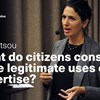conflating
What is risk aversion?
The British Journal for the Philosophy of Science, doi.org/10.1093/bjps/axx035 Abstract According to the orthodox treatment of risk preferences in decision theory, they are to be explained in terms of th
The knowledge-management complex: From quality registries to national knowledge-driven management in Swedish health care governance
Politics & Policy Abstract This article analyzes the emergence of the Swedish “national system for knowledge-driven management.” We argue that the system is best understood as a meta-instrument that
Public services demokratiska uppdrag. Fri åsiktsbildning och offentligt förnuft
Statsvetenskaplig Tidskrift 126:2, 355–372 Abstract The democratic significance of public broadcasting corporations has gained renewed urgency as a result of developments in the outside world and the ong
Defining Information Security
Science and Engineering Ethics 25(2): 419–444. https://doi.org/10.1007/s11948-017-9992-1. Abstract This article proposes a new definition of information security, the ‘Appropriate Access’ definition. Apar
Climate-friendly food-choice intentions among emerging adults: extending the theory of planned behavior with objective ambivalence, climate-change worry and optimism
Frontiers of Psychology, Sec. Environmental Psychology, vol. 14. Abstract Climate-friendly food choices are still relatively rarely addressed in studies investigating climate engagement, particularly am
Albert Weale: Democracy Across Time
Albert Weale, Emeritus Professor of Political Theory and Public Policy at University College London. AbstractMany democratically made choices involve commitments across time. International obligations,
Spatial Numerical Associations by Modality: the Differences Between Symbolic and Non-Symbolic Numerical Representations
Quarterly Journal of Experimental Psychology 72 (10), 2423-2436 Abstract During the last decades, there have been a large number of studies into the number-related abilities of humans. As a result, we kn
Completed: Covid-19 effects on social norms and collaboration
Covid-19 has resulted in restrictions, school closures and quarantine, but how has the pandemic changed our social patterns and norms?
Eri Bertsou: Varieties of Expertise: What do citizens consider to be politically legitimate uses of expertise
Venue: Institutet för framtidsstudier, Holländargatan 13, 4th floor, Stockholm, and online Research seminar with Eri Bertsou, Assistant Professor of Political Science, University of St. Gallen (HSG).REG

Eri Bertsou: What do citizens consider to be politically legitimate uses of expertise?
Can democratic politics incorporate citizen demands for independent expertise in ways that boost legitimacy and trust in politics? Democratic governments worldwide face the dilemma of how to deal with








